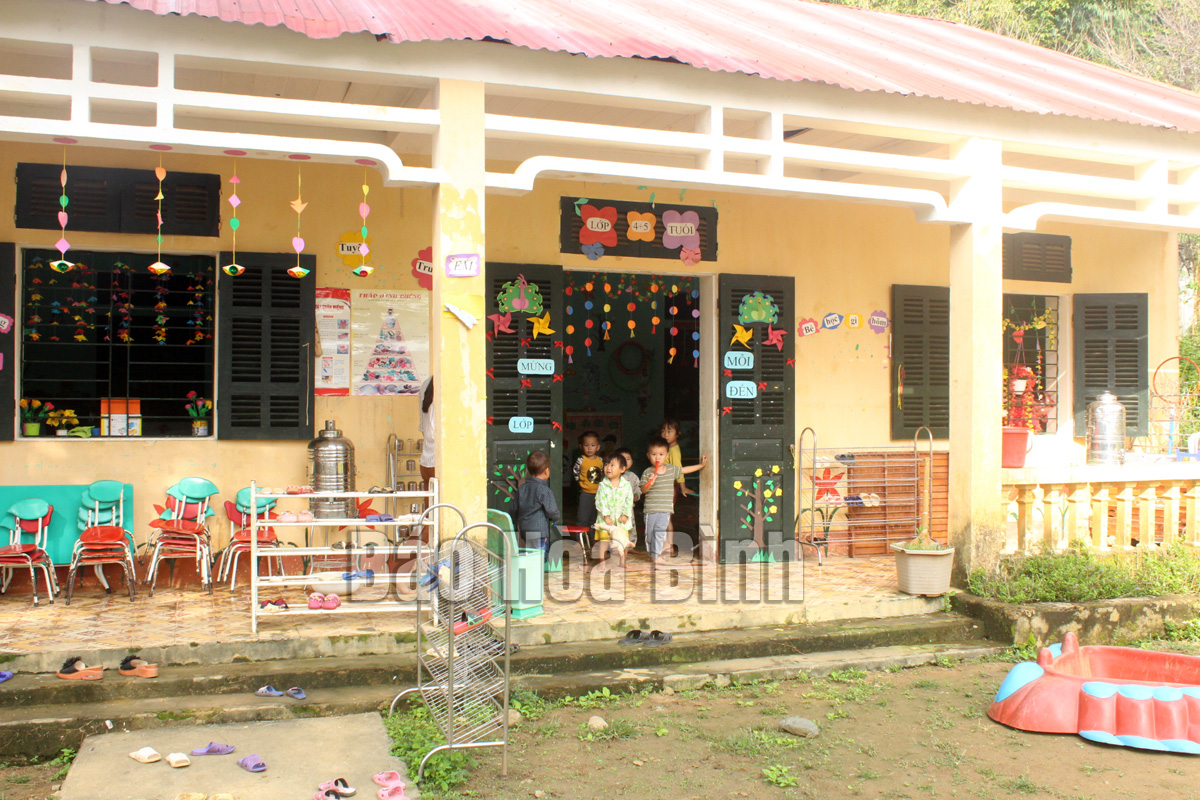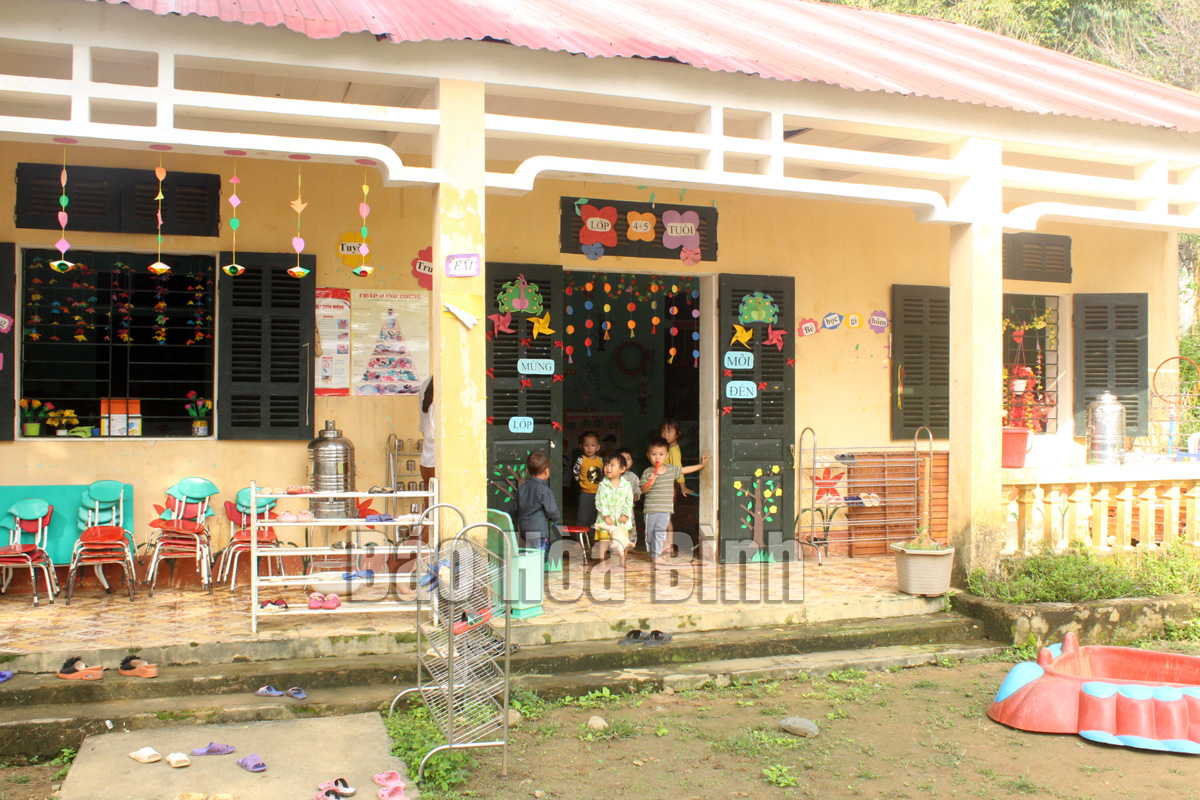
(HBO) – The Prime Minister has issued Decision No. 1719/QD-TTg dated October 14 approving the National Target Programme on boosting socio-economic development in ethnic minority-inhabited and mountainous areas in the 2021-2030 period, with its first phase spanning from 2021 to 2025. The approval of the progamme has specified the Party, State and Government’s policies on ethnic affairs, while giving solutions to boost socio-economic growth in association with the implementation of the policies, meeting the expectations of ethnic minority groups.
Photo: Thanks to investment from programmes and projects, a
number of schools in Nanh Nghe commune in Da Bac district of Hoa Binh province
have been built to meet locals’ demand.
The programme has ten component projects, focusing on solving the shortage of
land for housing and farming as well as clean water; arranging and stabilising
the living conditions of residents in difficult areas; developing sustainable
agricultural and forestry production; building essential infrastructure system;
improving the quality of education and training to develop human resources;
preserving and promoting the traditional cultural values of ethnic minorities
in association with tourism development; improving health care services for
people; implementing gender equality; investing in the development of ethnic
minority groups with very few people and groups facing many difficulties;
strengthening communications in the ethnic minority-inhabited and mountainous
regions.
Hoa Binh has 145 out of 151 communes, wards and towns which are ethnic
minority-inhabited and mountainous areas with 86 villages and hamlets facing
extreme difficulties. In the past years, the province has prioritised the
allocation of human resources to investment programmes and projects for ethnic
minority-inhabited and mountainous areas, especially those with extremely
difficult conditions. The efforts have made positive impacts on people's lives,
creating a motivation for the development of ethnic minority-inhabited and
mountainous areas, gradually narrowing the development gaps among
regions.
Mountainous areas have seen many positive changes. However, according to the
provincial Committee for Ethnic Minority Affairs, due to a low starting point,
the living conditions of people from ethnic minority groups in the villages and
communes with extremely difficult economic conditions remained poor. They
mostly live on small-scaled agricultural and forestry production. Their
livelihood remains unstable, and their access to social service is still
limited. Although the ratio of poor households has decreased, the risk of
falling back into poverty is high, while the quality of human resources is low,
with modest capacity of local officials. In addition, gender equality remains a
problem among ethnic minority groups, along with outdated customs such as child
marriage, consanguineous marriage, social evils, and socio-economic development
gaps among regions.
In this context, the building and approval of the National Target Programme on
socio-economic development in ethnic minority-inhabited and mountainous areas
in the province has an important and urgent significance, aiming to promote
sustainable development, consolidate and enhance people's confidence in the
Party and State.
The objectives of the ten component projects in the period of 2021 - 2025
include doubling income of people from ethnic minority groups in 2020; reducing
the ratio of poor households by 2.5-3 percent each year; bringing 50 percent of
communes and villages out of the list of areas with extremely difficult
conditions; building roads for automobiles to 100 percent of communes,
concreting 90 percent of roads connecting the centres of communes and villages;
upgrading 100 percent of schools and health care stations; and establishing
public internet service supply centres in all communes./.
In the spirit of "Party members go first, the people follow”, all households of Party members in the Doan Ket sub-region in Da Bac town, Da Bac district, voluntarily removed gates and fences, and donated land when the road expansion project passed through their properties. Inspired by their example, 68 households in the sub-region quickly followed suit, contributing over 1,400 sq.m of residential and perennial cropland to widen the main road through the residential area. The exemplary role of Party members in Doan Ket stands as a shining example of studying and following President Ho Chi Minh’s thought, morality, and lifestyle.
The Hoa Binh provincial People's Committee held a monthly meeting on May 29 to assess the implementation of socio-economic development tasks in the first six months of 2025, the progress of key projects, and some other important issues.
During his lifetime, President Ho Chi Minh always expressed his deep affection and special concern for children and youth. He once emphasized: "Caring for and educating children well is the responsibility of the entire Party and the entire people”; "First of all, the family (i.e. grandparents, parents, siblings) must do this job well”. "the Party Committees…, the Children’s Committee, the Youth Union, the education sector, and all related organizations must have specific plans to ensure children grow healthier and more progressive”. His teachings has been remaining valuable and serving as the guiding principles in the work of protecting, caring for, and educating children. In line with this ideology, Hoa Binh Province has continuously been prioritizing and investing resources in the well-being of children in recent years.
Mr. Nguyen Phi Long, the alternate Member of the Party Central Committee and Secretary of the Provincial Party Committee chaired the meeting of the Standing Committee of the Provincial Party Committee to provide opinions on several investment projects within the province. There was the attendance of Ms. Bui Thi Minh, the Permanent Deputy Secretary of the Provincial Party Committee and Chairwoman of the Provincial People’s Council; Mr. Bui Đuc Hinh, the Deputy Secretary of the Provincial Party Committee and Chairman of the Provincial People’s Committee and other members of the Standing Committee; the leaders from other departments, agencies, and some localities.
The Standing Board of the Vietnam Fatherland Front (VFF) Committee of Hoa Binh province held a meeting on May 28 to honour outstanding village elders, village heads, and reputable individuals from local ethnic minority and religious communities.
In mid-May, the provincial Museum organised an exhibition named "Duoi la co Dang Cong san Viet Nam quang vinh” (Under the flag of the glorious Communist Party of Vietnam). This meaningful activity took place in the joyful atmosphere to celebrate the country's major holidays and the Party congresses at all levels for the 2025-2030 term, towards the 14th National Party Congress.



